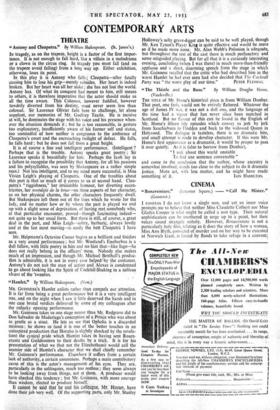CONTEMPORARY ARTS
THEATRE
44 Antony and Cleopatra." By William Shakespeare. (St. James's.)
IN tragedy, as on the trapeze, height is a factor of the first impor- tance. It is not enough to fall hard, like a villain in a melodrama or a clown in the circus ring. In tragedy you must fall (and on the trapeze avoid falling) from a long way up. Either exhibition, otherwise, loses its point.
In this play it is Antony who falls ; Cleopatra—after fatally causing him to lose his grip—merely subsides. Her heart is indeed broken. But her heart was all her stake ; she has not lost the world. Antony has. Of what its conquest had meant to him, still means to others, it is therefore imperative that the actor should make us all the time aware. This Colossus, however fuddled, however tawdrily diverted from his destiny, must never seem less than colossal. Sir Laurence Olivier fails here to challenge, let alone supplant, our memories of Mr. Godfrey Tearle. He is incisive at will, he dominates the stage with his voice and his presence when- ever the situation demands it ; but he is too reasonable, in gesture too explanatory, insufficiently aware of his former self and status, too unmindful of how neither is congruous to the ambience of Cleopatra's court and the encroaching twilight of defeat. He falls, he falls hard ; but he does not fall from a great height.
It is of course a fine and intelligent performance. (Intelligent ? Perhaps that is the trouble. Antony speaks great poetry ; Sir Laurence speaks it beautifully for him. Perhaps the fault lay in a failure to recognise the possibility that Antony, for all his passions and his polysyllaWes, was seen by Shakespeare as a rather simple man.) Not less intelligent, and to my mind more successful, is Miss Vivien Leigh's playing of Cleopatra. One of the troubles about this part is that so much of it comes to us at second hand. Cleo- patra's " riggishness," her irresistible humour, her diverting eccen- tricities, her nostalgie de la boue—on these aspects of her character, as on her physical charms, the other characters frequently dwell. But Shakespeare left them out of the lines which he wrote for the lady, and no matter how or by whom the part is played we end up with a slight sense of deprivation, of having met somebody who, at that particular encounter, proved—though fascinating indeed— not quite up to her usual form. But there is still, of course, a great deal in the part, and Miss Leigh—sultry, barbaric, always lovely and at the last most moving—is easily the best Cleopatra I have seen.
Mr. Helpmann's Octavius Caesar begins as a brilliant and finishes as a very sound performance ; but Mr. Wooland's Enobarbus is a dull fellow, with little poetry in him and no hint that—like lago—he does not really belong in the officers' mess. Nobody else makes much of an impression, and though Mr. Michael Benthall's produc- tion is admirable, it is not in every case helped/by the costumes. Antony's do not suit the man of action and Alexas is condemned to go about looking like the Spirit of Cocktail-Shaking in a tableau vivant of the 'twenties.


































 Previous page
Previous page